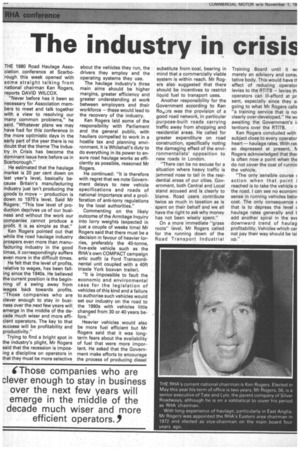The industry in crisis
Page 30

If you've noticed an error in this article please click here to report it so we can fix it.
THE 1980 Road Haulage Association conference at Scarborough this week opened with some straight talking from national chairman Ken Rogers, reports DAVID WILCOX.
"Never before has it been so necessary for Association members to meet and talk together with a view to resolving our many common problems," he said. "Whatever plans we may have had for this conference in the more optimistic days in the early part of the year there is no doubt that the theme The Industry in Crisis has become the dominant issue here before us in Scarborough."
He estimated that the haulage market is 20 per cent down on last year's level, basically because Britain's manufacturing industry just isn't producing the goods to move – production is down to 1975's level. Said Mr Rogers: "This low level of production deprives us of our business and without the work our companies cannot produce a profit. It is as simple as that."
Ken Rogers pointed out that while the road haulage industry prospers even more than manufacturing industry in the good times, it correspondingly suffers even more in the difficult times.
He felt that the level of profits, relative to wages, has been falling since the 1940s. He believed the current position is the beginning of a swing away from wages back towards profits. "Those companies who are clever enough to stay in business over the next few years will emerge in the middle of the decade much wiser and more efficient operators. The key to that success will be profitability and productivity."
Trying to find a bright spot in the industry's plight, Mr Rogers said that the recession is imposing a discipline on operators in that they must be more selective about the vehicles they run, the drivers they employ and the operating systems they use.
The haulage industry's three main aims should be higher margins, greater efficiency and greater understanding at work between employers and their workforce – these would lead to the recovery of the industry.
Ken Rogers laid some of the responsibility with Parliament and the general public, with hauliers compelled to work in a hostile tax and planning environment. It is Whitehall's duty to do everything in its power to ensure road haulage works as efficiently as possible, reasoned Mr Rogers.
He continued: "It is therefore with regret that we note Government delays to new vehicle specifications and roads of national importance and a proliferation of anti-lorry regulations by the local authorities."
Commenting on the likely outcome of the Armitage Inquiry into lorry weights (expected in just a couple of weeks time) Mr Rogers said that there must be a decision in favour of heavier lorries, preferably the 40-tonne, five-axle vehicle such as the RHA's own COMPACT campaign artic outfit (a Ford Transcontinental unit coupled with a 40ft triaxle York boxvan trailer).
"It is impossible to fault the economic and environmental case for the legislation of vehicles of this kind and a failure to authorise such vehicles would set our industry on the road to the 1990s with vehicles little changed from 30 or 40 years before."
Heavier vehicles would also be more fuel efficient but Mr Rogers said that it was longterm fears about the availability of fuel that were more important. He asked that the Government make efforts to encourage the process of producing diesel substitute from coal, bearing in mind that a commercially viable system is within reach. Mr Rogers also suggested that there should be incentives to restrict liquid fuel to transport uses.
Another responsibility for the Government according to Ken Ro,-..;rs was the provision of a good road network, in particular purpose-built roads carrying traffic away from shopping and residential areas. He called for greater expenditure on road construction, specifically noting the damaging effect of the environmentalists' opposition to new roads in London.
"There can be no excuse for a situation where heavy traffic is jammed nose to tail in the residential areas of our cities, Government, both Central and Local stand accused and is clearly to blame. Road users contribute twice as much in taxation as is spent on their behalf and we all have the right to ask why money has not been wisely spent."
On a more immediate "grass roots" level, Mr Rogers called for the running down of the Road Transport Industrial Training Board until it wi merely an advisory and const tative body. This would have ti effect of reducing operator levies to the RTITB – levies th operators can ill-afford at pr sent, especially since they al going to what Mr Rogers calle "a training service that is no clearly over-developed." He m awaiting the Government's tentions over the RTITB.
Ken Rogers concluded with subject close to every operator heart— haulage rates. With rat so depressed at present, N Rogers acknowledged that thei is often now a point when the do not cover the cost of runnin the vehicle.
"The only sensible course action when that point i reached is to take the vehicle o the road. I can see no econom sense in running vehicles belol cost. The only consequence that is to depress the level haulage rates generally and t add another spiral in the evE downward trend of haulag profitability. Vehicles which car not pay their way should be lai up."




























































































